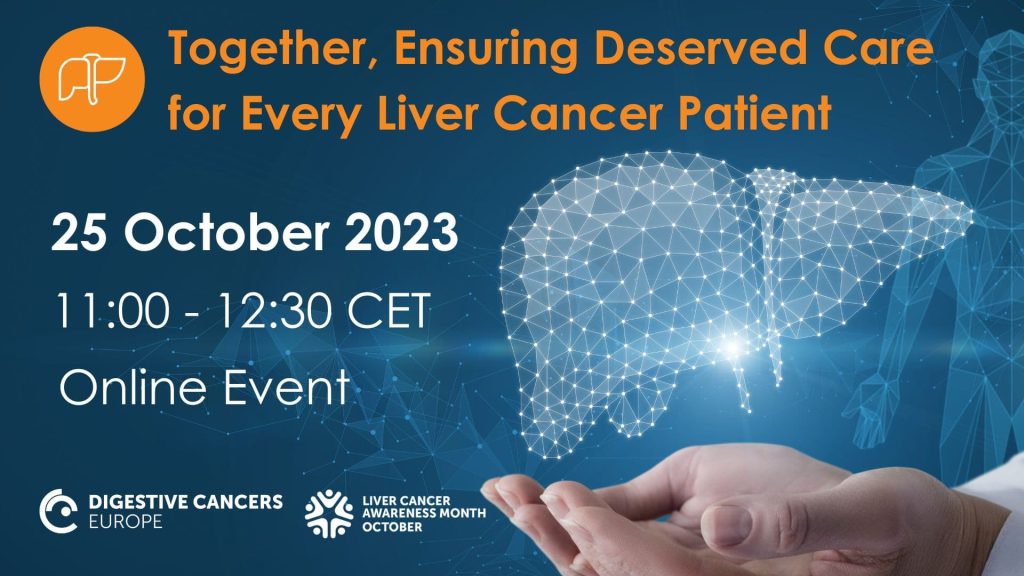- Weekly e-newsletters that translate the Liver Cancer research into everyday language
- “Did you know?” facts that highlight risks, early warning signs, and screening
- Patient stories that bring real experience to the forefront of care conversations

October 2022
Lorenza Rimassa and Manon Allaire – both part of the driving force behind ILCA – were involved in the online event, “Together, Ensuring Deserved Care for Every Liver Cancer Patient,” organised by Digestive Cancers Europe.
They joined leading experts, researchers, and patient advocates top discuss the latest advancements in liver cancer research, screening, early diagnosis, and innovative treatment approaches.
Liver cancers are not always easy to detect at an early stage, therefore the management of this disease is quite complex. It is important to guarantee patients a multidisciplinary team including oncologists, hepatologists, basic researchers, surgeons, pathologists, radiologists and nurses to provide an overview of the disease and help detect the related symptoms.
ILCA serves as a great environment for all these specialists to exchange knowledge and updates in order to put their efforts together through different educational content. Hear more on this subject from Lorenza Rimassa and Alejandro Forner.
Basic scientists and clinicians are constantly working together to identify people who are at a higher risk of developing liver cancer. However, this sneaky disease cannot give symptoms right away and its metabolic-associated risks are increasing more and more.
Keeping this in mind you can actively limit your risk factor of developing by reducing the consumption of alcohol, having an active life and reducing fats in your diet.
Hear more on metabolic-associated risk factors from Monika Lewinska from the Y-ILCA Committee.
Bruno Sangro and Manon Allaire are the ambassadors of ILCA’s advocacy activities and as they explain, it is our duty to guarantee patients a certain level of surveillance and include them at the core of our activities. Prevention is crucial and putting a spotlight on the disease is a must.
That is why ILCA is committed to raise awareness of liver cancer and to improve patient centricity.
This Liver Cancer Awareness Month, European and global organisations are united under the call for greater focus on prevention and early detection.
October 2022
Treatment of cancer has recognised a true revolution in the past two decades and whoever treats liver tumours could not hope for a best term to shake up clinical practice.
For way too long and despite incessant efforts from clinicians, patients, universities, charities and industry – liver tumours have remained neglected orphans from the transformative changes that chemotherapy has lent to a wide variety of cancers including breast, lung, ovary and many others. Hepatocellular cancer, the most common form of liver cancer, is tough to treat as it arises most frequently in a scarred liver. Demonstrating that drug therapy was worth pursuing in this highly untreatable cancer type took years and for over a decade we only had one drug to treat it.
At medical conferences and in the clinic, more and more we hear a word being pronounced. One that we desperately needed: choice. Because after years of failure now an increasing number of drugs are available to patients and a disease that would prove fatal in 3-6 months can be successfully managed for up to 2 years in patients who respond to treatment.
We have learnt over the years that hepatocellular cancer is often invisible to our own immune system and developed immunotherapy to remove the “invisibility cloak” that protects cancer from our own natural defences. The same approach is proving useful in bile duct cancers, a rarer form of liver cancer from which we have learnt that combining chemotherapy and immunotherapy may be the way forward. For this rare tumour we have also learnt that new targeted agents are effective for specific patient groups.
As novel choices for treatment arise it becomes crucial that, as a society, we are able to offer these treatments to everyone who needs them and understand who has the best chance of responding to each type of therapy. New drugs can be expensive and may not benefit all, so a lot of work remains to be done to make anti-cancer therapy affordable, universal and truly personalised. Such goals, which inspire everyone who treats liver cancer, requires everyone to work together and promote change in the way we treat liver tumours: a task that cannot happen overnight. Researchers, patients and doctors need constant support, funding and training. ILCA – International Liver Cancer Association – has been since 2007 not only a space to discuss ideas but truly one of the most authoritative voices of a global community in dire need of change, having cultivated the objective of beating liver cancer sooner through research, education and innovation.
We are at a turning point for the treatment of this disease, we have new drugs and we will have more in the near future. By working all together with the ultimate goal of improving not only the prognosis but also the quality of life of our patients, we will finally be able to offer true hope for patients affected by liver cancer.
Awareness videos
Liver cancer: Causes and distribution around the world
Liver cancer is the most common cause of death in patients with liver disease. The most frequent causes are:
- Infection of the liver by virus such as HBV or ACV
- Alcohol abuse
- Accumulation of fat due to obesity
The good news is that we can reduce the risk of developing liver cancer with the introduction of HBV vaccine and antiviral drug against HCV, with the reduction of alcohol intake and a healthy lifestyle.
Importance of early diagnosis of CCA
Cholangiocarcinoma is a deadly cancer whose symptoms appear relatively late. In early stages, we can apply surgical techniques, and this is the only potential for cure -that’s why early diagnosis is key to survival. Cholangiocarcinoma may be related to symptoms such as:
- Jaundice
- Abdominal pain
- Weight loss
- Fever
- Loss of appetite
If you have any of these, the best is to go to your general practitioner and get checked. Early diagnosis can make a real difference.
Cholangiocarcinoma: How to get the best treatment
Cholangiocarcinoma is a complex disease, and once diagnosed, it’s critical to assess the best treatment approach.
Here are some recommendations for CCA patients:
- Be treated in a referral center
- Have a molecular profiling of the tumor
- Get involved in clinical trials.
Hepatocellular carcinoma: the importance of being evaluated at a referral center
Hepatocellular carcinoma, or HCC, is the most frequent type of primary liver cancer. As it’s a complex disease, it’s important that patients are evaluated at a referral center and treated by a multi disciplinary team, who will offer the best cure options.
Different types of primary liver cancer.
Primary liver cancer is not a single disease, it includes both hepatocellular carcinoma (HCC) and cholangiocarcinoma (CCA).
The existing diagnosis and treatment for each type are not the same, and that’s why it is important to understand the differences between these two types.
Patients with cirrhosis are at a heightened risk of developing liver cancer.
Keeping these patients under surveillance is crucial in terms of survival. Although ultrasound surveillance can improve the detection of early HCC, it is not 100% accurate. That is why it is important to educate patients enough to speak up for themselves and to actively undergo surveillance. Awareness is the key: knowing risk factors and knowing if you have liver diseases can really help you in detect a liver cancer.
I am text block. Click edit button to change this text. Lorem ipsum dolor sit amet, consectetur adipiscing elit. Ut elit tellus, luctus nec ullamcorper mattis, pulvinar dapibus leo.
Podcasts
In this podcast, Valerie Paradis and Varela Barcena discuss four different papers presented at ILCA22. These interesting works have the aim to combine experimental models and studies of clinical patients and identify new cellular target based on immune cells. This will help to predict the response to immune therapy and understand the prognosis of HCC.
In this episode David Pinato comments on the ILCA 2022 session on Diagnosis, Imaging and Biomarkers for HCC. Hear his considerations and analysis on novel biomarkers, protein biomarkers and gut microbiomes as potential sources of clinical available biomarkers in the setting of early diagnosis of liver cancers.
Medical education is key to improve liver surgery as well as preparing surgical procedures and setting technological tools in advance. In this podcast Gonzalo Sapisochin and Eric Vibert will go through the surgical session at ILCA2022, summarising and commenting on the future of liver surgery for primary liver cancer.
In this episode, Associate Professor at Humanitas University and IRCCS Humanitas Research Hospital, Lorenza Rimassa, and Medical Doctor at BCLC group, Marco Sanduzzi Zamparelli, summarise the abstracts presented in General Session 4 – Therapy & Miscellaneous & Clinical Trials in progress during #ILCA22.
In this episode, Transplant Hepatologist at Royal Prince Alfred Hospital, Ken Liu, and Professor of Medicine at UT Southwestern Medical Center, Amit Singal, cover some of the highlights from the General Session 2: Epidemiology, Staging and Prognosis of HCC at the ILCA Annual Conference 2022.


